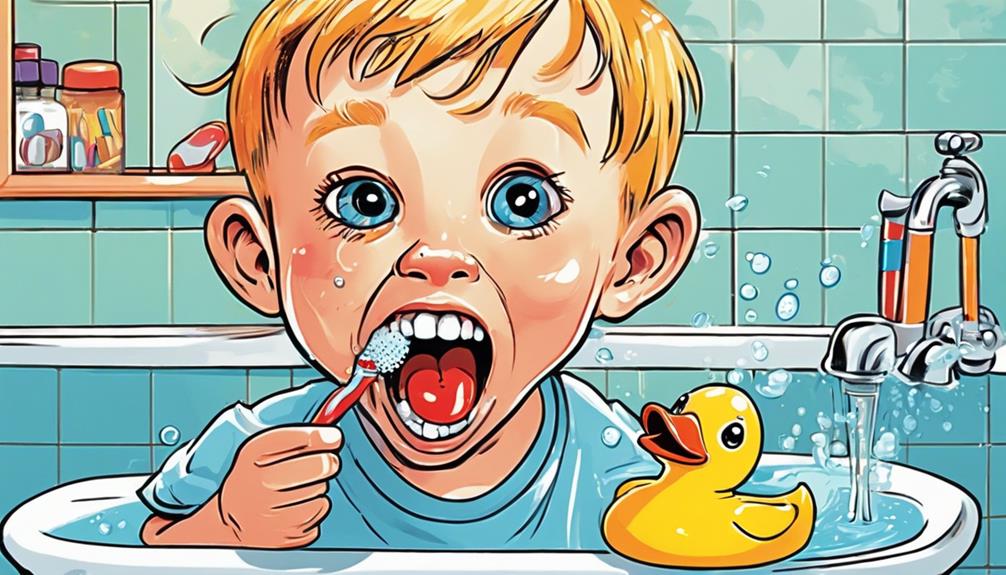Rinsing with salt water daily can greatly boost your child's oral health. It acts as a natural disinfectant, killing harmful germs and supporting healthy gums. This simple routine also helps reduce inflammation and speeds up healing for any injuries or infections in the mouth. By creating an alkaline environment, salt water inhibits harmful bacteria and plaque buildup, promoting better hygiene overall. It's easy to prepare: just mix a teaspoon of salt in warm water. Incorporating this practice can foster good habits early on, leading to long-term health benefits. You might discover even more tips and insights on this topic.
Key Takeaways
- Saltwater rinses promote healthy gums and reduce the risk of cavities, improving overall oral health in children.
- Rinsing with saltwater helps alleviate sore throats and reduces inflammation, providing comfort during illness.
- The hypertonic environment created by salt inhibits harmful bacterial growth, supporting better oral hygiene habits.
- Regular rinsing aids in healing oral tissues after dental procedures and promotes recovery from infections.
Benefits of Salt Water Rinse

Rinsing with salt water offers a variety of benefits that can greatly improve your child's oral health. Incorporating a salt water rinse into your child's oral health routine is a simple yet effective way to promote healthy gums and support overall dental well-being. This home remedy acts as a natural disinfectant, effectively killing harmful oral microbes that contribute to cavities and gum disease.
If your child is struggling with a sore throat or oral infections, rinsing with salt water can provide quick relief, easing discomfort while promoting healing. The alkaline environment created by the salt water increases the pH balance in your child's mouth, making it less inviting for bacteria that thrive in acidic conditions.
Regular use of a salt water rinse not only helps combat existing issues but also reinforces good oral hygiene habits in your child. Plus, it's an easy and cost-effective addition to their daily routine.
Preparation of Salt Water Rinse

To prepare a salt water rinse, mix 1 teaspoon of salt into 8 ounces of warm distilled or filtered water until it's fully dissolved. Using warm water not only helps the salt dissolve properly but also makes the rinse soothing for your oral tissues.
For the best results, always prepare a fresh solution each time you rinse, as this maximizes its effectiveness and prevents contamination.
Here's a quick guide for your daily oral hygiene routine:
- Gather Your Ingredients: You'll need 1 teaspoon of salt, 8 ounces of warm distilled or filtered water, and optionally, 2 teaspoons of baking soda for added antibacterial properties.
- Mix the Solution: Combine the salt (and baking soda, if using) in the warm water, stirring until fully dissolved.
- Use While Warm: For ideal relief, use the rinse while it's still warm, especially if you're addressing sore throats or oral discomfort.
Recommended Usage Frequency

Kids should rinse with salt water 1-2 times daily to effectively reduce inflammation in their gums and boost overall oral hygiene. Doing this after meals is particularly beneficial, as it helps remove food particles and prevent plaque buildup. Establishing a routine is key to maintaining your child's oral health.
For children recovering from oral surgery or dealing with infections, you might consider increasing the frequency of salt water rinses to 2-3 times daily. However, it's vital to monitor for any discomfort, as excessive rinsing can irritate oral tissues. Finding the right balance is important for maximizing benefits while minimizing risks.
Always remember that every child's needs are different. Consulting a dentist is advisable to personalize the frequency of salt water rinses based on your child's specific oral health requirements. A dental professional can provide tailored recommendations to guarantee your child enjoys the full benefits of this simple yet effective practice.
Precautions to Consider

When considering saltwater rinses for your child, be aware of any sodium sensitivity they might have.
It's also important to monitor their oral hydration, as too much salt can lead to dryness.
Keep an eye on how they respond to the rinse and adjust usage accordingly.
Sodium Sensitivity Concerns
Consulting a healthcare provider is essential for children with sodium sensitivity or related conditions before using saltwater rinses. These rinses can elevate blood sodium levels, leading to potential health concerns, especially in kids with hypertension. It's important to be cautious, as excessive salt intake may cause dehydration, a common issue among children who mightn't drink enough fluids throughout the day.
Here are three important precautions to take into account:
- Adjust Salt Concentration: Use a lower concentration of salt in the rinse to minimize irritation or discomfort in sensitive oral tissues, particularly in younger children with developing gums.
- Monitor Oral Sensitivity: Pay attention to how your child's mouth reacts to saltwater rinses. If you notice any irritation, discontinue use and consult a healthcare provider.
- Track Sodium Intake: Keep an eye on your child's overall sodium consumption to avoid adverse health effects, as high sodium levels can increase the risk of cardiovascular issues later in life.
Monitor Oral Hydration
Maintaining proper oral hydration is essential, especially since excessive saltwater rinses can lead to dehydration in children. It's important to monitor their fluid intake to guarantee they're drinking enough water. While saltwater rinses can be beneficial, they can also cause dryness in the mouth, making water consumption critical after rinsing.
Children are more susceptible to dehydration, so balancing saltwater rinsing with adequate hydration is key. High sodium intake from frequent rinses might affect blood sodium levels, so keep an eye on their overall diet.
Encourage your kids to sip water after each rinse to counteract any drying effects and support saliva production. Saliva is significant for oral health, helping to neutralize acids and wash away food particles.
Additional Oral Health Practices

In addition to rinsing with salt water, you should focus on other essential oral health practices.
Regular brushing, flossing, and limiting sugary snacks can greatly enhance your child's dental hygiene.
Plus, don't forget to schedule those dental check-ups every six months to catch any potential issues early.
Complementary Hygiene Habits
Complementary hygiene habits play an important role in enhancing children's oral health and preventing dental problems. Alongside a salt water rinse, you can establish a strong foundation for oral hygiene that greatly reduces the risk of tooth decay and gum disease.
Here are three key practices to incorporate into your child's daily routine:
- Brushing Teeth: Encourage your child to brush their teeth twice a day with fluoride toothpaste. This helps strengthen enamel and combat cavities effectively.
- Flossing Daily: Teach your child to floss at least once a day. Flossing removes plaque and food particles from between teeth, areas that brushing might miss, promoting overall oral hygiene.
- Limit Sugary Treats: Help your child understand the importance of limiting sugary foods and beverages. Reducing sugar intake can greatly lower the risk of tooth decay and gum disease.
Additionally, make sure your child stays hydrated by drinking plenty of water to rinse away food particles and bacteria.
Regular Dental Check-ups
Regular dental check-ups are key to spotting potential oral health issues early and ensuring your child's smile stays bright and healthy. By scheduling these visits at least twice a year, you're investing in your child's long-term dental health. These appointments allow for professional cleaning and examination, which are essential for maintaining good oral hygiene.
Regular dental check-ups serve as preventive care, helping to identify and manage conditions like cavities and gum disease before they escalate into more serious problems. Pediatric dentists recommend starting dental visits by your child's first birthday, establishing a foundation for healthy habits early on. This proactive approach not only addresses existing issues but also teaches your child the importance of maintaining their oral health.
During check-ups, your child will learn proper brushing and flossing techniques, fostering a sense of responsibility towards their dental care. By prioritizing these regular visits, you're not just ensuring your child's immediate dental health but also equipping them with the knowledge to practice good oral hygiene throughout their life.
Historical Context of Salt Usage

Salt has played an essential role in medicine since ancient times, with civilizations like the Egyptians and Greeks recognizing its healing properties long before modern practices emerged. Historical records show that salt wasn't just a seasoning; it was a powerful medicinal tool. Ancient civilizations utilized salt to promote healing in various ways, revealing its importance in their healthcare systems.
Here are three key aspects of salt's historical significance:
- Wound Treatment: Egyptians used salt in anti-infective solutions as early as 1600 B.C., showcasing its role in fighting infections.
- Anti-inflammatory Uses: Ancient Greeks combined salt with honey to create effective treatments for wounds, leveraging its anti-inflammatory properties over 2,000 years ago.
- Oral Health Applications: Historical records indicate that salt was commonly administered orally, as ointments, or in suppository form for various health conditions.
This rich history highlights how salt has long been valued for its medicinal qualities, forming the foundation for practices like saltwater rinses that promote oral health today.
Embracing this ancient wisdom can benefit kids' well-being in a modern context.
Mechanism of Action

When you rinse with salt water, you're not just freshening your mouth; you're also balancing the pH to create an environment where harmful bacteria struggle to survive.
This helps reduce their growth and supports healing in your child's oral tissues, especially after dental work or when dealing with mouth sores.
Ph Balance Improvement
Rinsing with salt water raises the mouth's pH balance, creating an alkaline environment that hinders harmful bacteria from thriving. This practice is vital for maintaining good oral health, especially for kids who are often exposed to sugary foods and beverages. By promoting a balanced pH level, a salt water rinse can greatly reduce the risk of dental issues.
Here are three key benefits of using a salt water rinse:
- Inhibits Plaque Accumulation: Regular rinsing helps to reduce plaque buildup, which is essential in preventing cavities and gum disease.
- Protects Tooth Enamel: An alkaline environment counteracts acidity that can erode tooth enamel, keeping teeth stronger and healthier.
- Enhances Overall Oral Hygiene: By maintaining a stable pH balance, salt water rinses support a healthier mouth, making it less favorable for harmful bacteria.
Incorporating a salt water rinse into your child's daily routine is a simple yet effective way to improve their oral health. With consistent use, you'll help safeguard their smiles against potential dental issues while promoting a healthier pH balance.
Bacterial Growth Inhibition
A saltwater rinse creates a hypertonic environment that effectively dehydrates harmful bacteria, inhibiting their growth and promoting better oral health. When you use saltwater rinses, you raise the pH balance in your mouth, creating an alkaline environment that's less favorable for harmful bacteria. This shift not only helps in bacterial growth inhibition but also combats the acidity that often supports the proliferation of dental plaque.
By rinsing regularly with saltwater, you can greatly reduce the microbial load in your mouth. Studies indicate that these saline solutions can effectively decrease plaque accumulation, which is primarily composed of bacteria. As a natural disinfectant, saltwater rinses work to kill harmful bacteria while supporting your overall oral hygiene.
Incorporating saltwater rinses into your daily routine can lead to healthier gums and teeth. You won't just be rinsing away debris; you'll also be actively inhibiting bacterial growth, reducing the chances of cavities and gum disease. This simple practice can make a big difference in your oral health, ensuring a cleaner and more balanced environment in your mouth.
Oral Tissue Healing
Using saltwater rinses can greatly enhance oral tissue healing by creating an alkaline environment that reduces inflammation and promotes recovery from injuries.
When you rinse with salt water, the antimicrobial properties of salt work to combat harmful bacteria, which is vital for your child's oral health. This process helps reduce inflammation in oral tissues and supports healing from gum sores and other injuries.
Here are three key benefits of incorporating saltwater rinses into your child's oral care routine:
- Reduced Inflammation: Saltwater helps draw out excess fluid from swollen tissues, alleviating discomfort and speeding up recovery from infections.
- Enhanced Regeneration: Regular rinsing with salt water can support the regeneration of human gingival fibroblasts, essential for maintaining healthy gum tissue.
- Improved Blood Flow: Saltwater rinses can increase blood flow to injured areas, ensuring important nutrients and immune response reach the site, aiding in the healing process.
Incorporating a salt water rinse into your child's daily routine can greatly contribute to their overall oral health and healing.
Healing Properties of Salt Water

Gargling with salt water can greatly reduce inflammation and promote healing in your child's oral tissues, especially when dealing with mouth sores or minor injuries. The healing properties of salt water rinses not only soothe discomfort but also enhance overall oral hygiene.
Here's a quick breakdown of how salt water can help:
| Benefit | Description | Result |
|---|---|---|
| Reduces Inflammation | Salt water helps minimize swelling and pain. | Faster recovery from mouth sores. |
| Promotes Healing | Facilitates healing of oral tissues after injuries. | Improved health of gums and mouth. |
| Supports Oral Hygiene | Creates an alkaline environment to inhibit bacteria. | Healthier mouth overall. |
Using a salt water rinse after dental procedures can also speed up recovery and decrease the risk of complications. With regular use, you'll notice your child's oral health improving, along with their comfort level. Encourage them to incorporate this simple routine, as it's an effective way to promote healing and maintain good oral hygiene.
Usage Scenarios for Rinsing

Rinsing with salt water can be especially helpful after dental work, providing relief and promoting healing for your child. It acts as a natural disinfectant, helping to prevent infections and support recovery.
Here are some key scenarios where a salt water rinse can be beneficial:
- Post-Dental Procedures: After tooth extractions or dental work, a salt water rinse can soothe a sore mouth and aid in healing, ensuring your child feels more comfortable.
- Daily Oral Hygiene: Encourage your child to rinse with salt water regularly to reduce plaque buildup. This helps combat bad breath and maintains overall oral hygiene, especially in kids prone to cavities.
- Mouth Sores: If your child has mouth sores or ulcers, a salt water rinse can provide much-needed relief and promote faster healing of the affected areas.
Research and Studies on Effectiveness

Research shows that salt water rinses can greatly improve oral hygiene and promote healing in children, making them a valuable addition to their health routine. A study by Aravinth A et al. (2017) found that using a saltwater rinse considerably reduced oral microbes, which helps combat plaque accumulation. This means that regular rinsing can keep your child's mouth cleaner and healthier.
Additionally, research indicates that saline solutions enhance healing and reduce inflammation, especially in children recovering from dental procedures (Stewart M et al., 2015). You might find that a simple saltwater rinse can be as effective as commercial mouthwashes in reducing plaque (Przybys J., 2015).
Moreover, saltwater rinses aren't just great for oral hygiene; they're also beneficial for soothing sore throats in children, providing much-needed relief (J Complement Altern Med Res, 2019).
Finally, hypertonic saline has even been shown to alleviate symptoms of respiratory infections, which can help your child stay healthy and reduce missed school days (Ramalingan S et al., 2019).
Incorporating saltwater rinses into your child's routine can support their overall health and well-being.
Frequently Asked Questions
Is It Okay to Rinse With Salt Water Every Day?
Yes, it's okay to rinse with salt water every day, but you should monitor for irritation. It's best to consult your dentist to determine the right frequency based on your specific oral health needs.
Can Children Rinse With Salt Water?
Did you know that over 70% of kids experience mouth issues at some point? Yes, kids can rinse with salt water! It helps reduce inflammation and bacteria, promoting better oral hygiene and soothing sore throats.
Why Is Salt Water Rinse Important?
Saltwater rinse is important because it helps reduce inflammation, fights harmful bacteria, and soothes sore throats. Regular rinsing can also promote faster healing after dental work and supports your overall oral health.
What Are the Benefits of Washing Your Face With Salt Water Everyday?
Did you know 85% of people experience acne at some point? Washing your face with salt water daily can reduce inflammation, draw out impurities, and improve circulation, leading to clearer skin and a healthier glow overall.
Conclusion
Incorporating a daily salt water rinse into your child's routine can greatly enhance their oral health.
Studies show that regular rinsing can reduce plaque buildup by up to 40%, making it a simple yet effective practice.
Besides fighting bacteria, it promotes healing for minor oral injuries.
By encouraging this habit, you're not just improving their smile but also instilling lifelong healthy habits.
So, grab some salt and help your kids rinse their way to better oral health!









